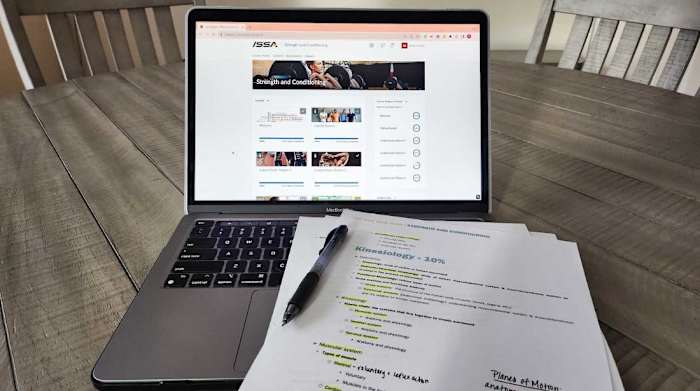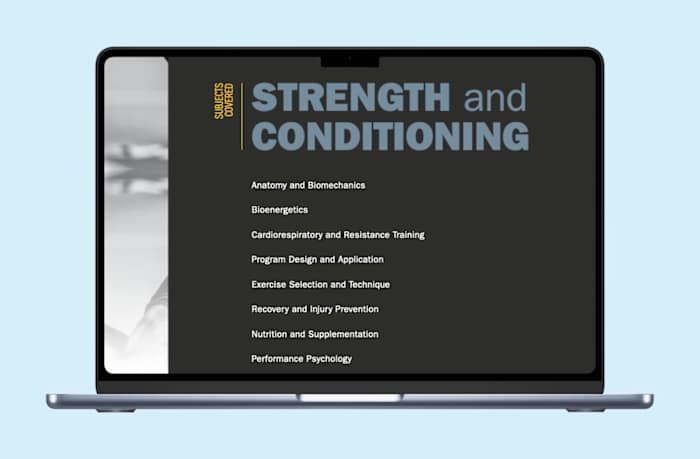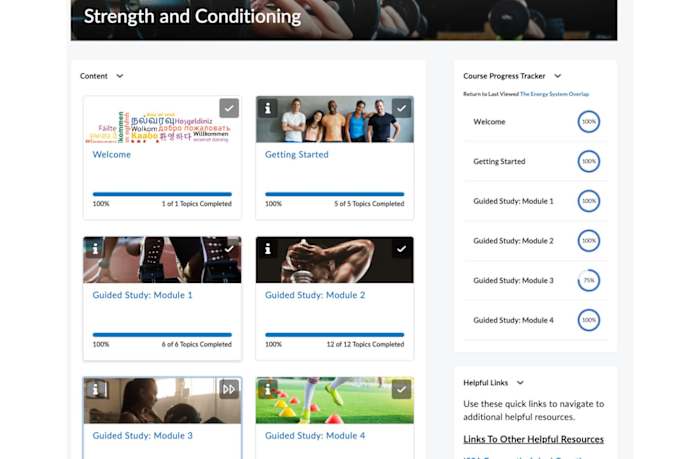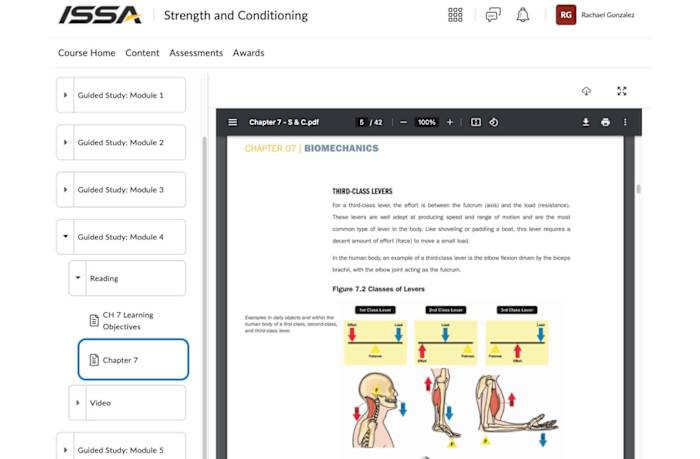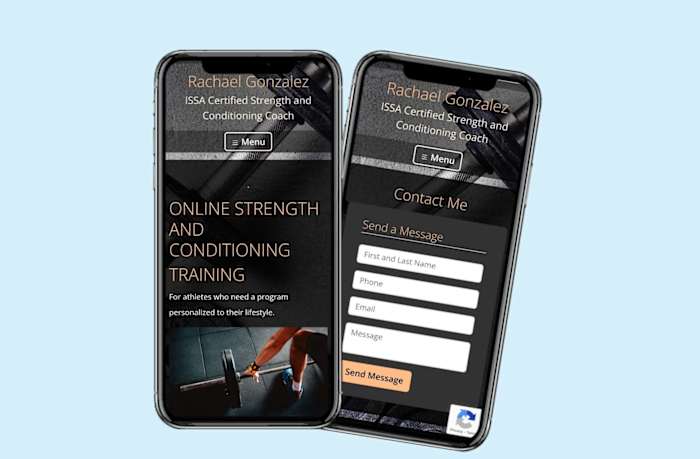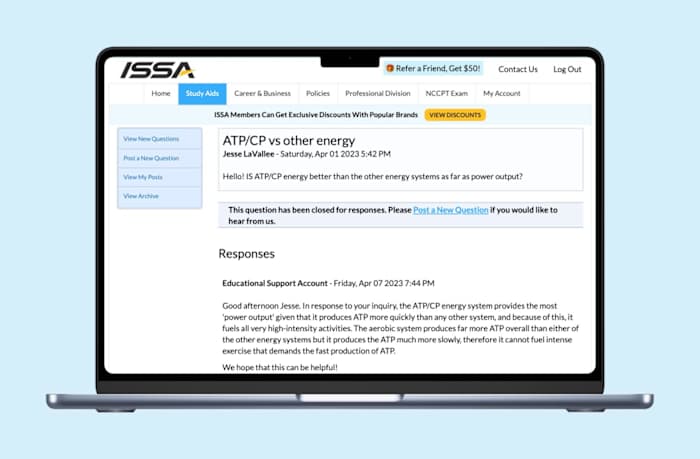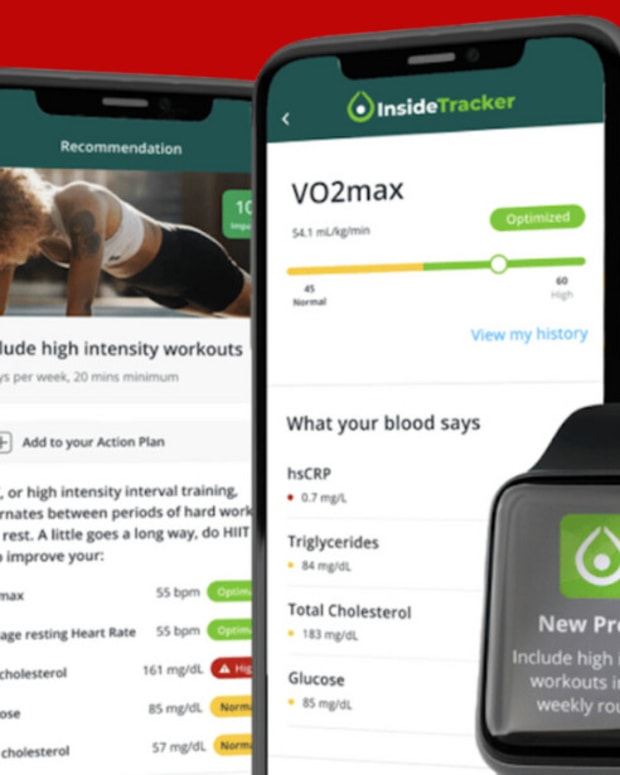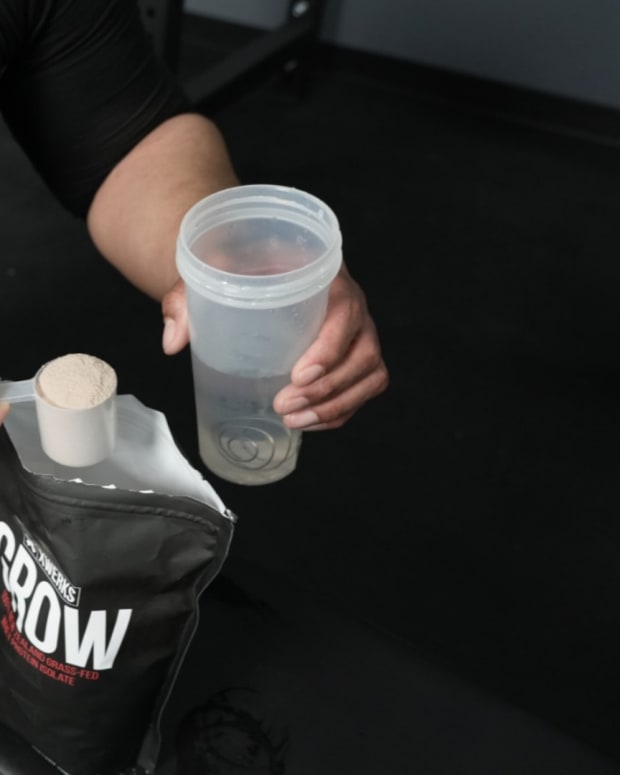The products featured in this article have been independently reviewed. When you buy something through the retail links on this page, we may earn commission at no cost to you, the reader. Sports Illustrated editorial staff are not involved in the creation of this content. Learn more here.
The International Sports Science Association (ISSA) Strength and Conditioning Certification Program is designed for individuals passionate about helping others achieve fitness goals. It provides instruction on mechanical and anatomical principles, sports psychology, how to create individualized fitness programs and how to conduct proper assessments.
I took this course to complement my current personal training certification because it offers the opportunity to work with a broader range of clients and the expertise to meet the demands of athletic training; however, if your main goal is to train athletes, this program provides everything you need to know on its own. In this ISSA Strength and Conditioning Certification review, I’ll cover what you need to know about this certification and provide details of my experience with the coursework, materials and exam.
ISSA Strength and Conditioning Certification at a Glance
Key features and specs
- Cost: $1,398–$2,046, 12-month, interest-free payment plans available
- Exam Type: Online (open-book or proctored); in-person (open-book or proctored)
- Length of Course: Must take the ISSA final exam within eight months or the National Council for Certified Personal Trainers Certified Strength Training Specialist (NCCPT-CSTS) exam within one year of purchase date
- Main Focus: Athlete training in strength, power, speed and agility
- Pre-Requisites: High school diploma or GED and Adult CPR/AED certificate required
- Pass Rate: 75 percent
Overview of the ISSA Strength and Conditioning Certification
The ISSA Strength and Conditioning Certification covers body composition, anatomy, movement patterns, recovery, injury prevention and corrective exercise, sports psychology and more. It prepares participants to support clients who have sport-specific training goals. Once completed, you can develop a personalized program for them.
This is a self-paced program broken into 12 modules. Each module has assigned readings, videos and quizzes to assess the learning objectives. There is an open-book or proctored exam, either of which can be taken in person or online. The ISSA website has study materials, including a movement library with video demonstrations and a study guide that outlines the exam. ISSA has a team of success coaches who offer support and answer questions on the interactive question board and via chat. The portal includes a step-by-step business guide and a free website portal. Once you're ISSA certified, you can use this to build your own website and brand.
What we like:
- Self-paced certification course with 12 modules to help with organization, learning pace and progress tracking
- Interactive question board and Student Success Coaches on standby to answer questions
- Course material is continually updated with new information and focuses on practical, applicable research and science-based information
- Prepares students for training, acquiring a job and business development and marketing
- Educational materials have a linear structure that works well for beginners or experienced elite trainers
- Two exam options so you can choose which works best for your career path
What to consider:
- Program and proctored exam fee is costly
- Textbook included is a PDF, so those who prefer a hard copy will need to purchase it for $60
- Lacks accessibility tools for individuals who have special needs
Content
Here’s a breakdown of the eight subjects covered and some examples of the chapters and content you will see:
- Anatomy and Biomechanics: The Roles of Muscle, Skeletal System and Joint Actions, Motor Commands, Anatomical Planes of Motion
- Bioenergetics: Converting ATP to Energy, The Energy Systems, The Whole Picture
- Cardiorespiratory and Resistance Training: The Respiratory System, Glycolytic and Antiglycolytic Training, Components of Endurance, Training for Aerobic Power, Loading Variations, Deloading
- Program Design and Application: Principles of Program Design, Cardio Programming for Cyclic Athletes, Training Microcycles, Fundamentals of Training Programming, Performance Assessments
- Exercise Selection and Technique: Flexibility, Plyometric Exercises, Core Exercises, Lower-Body Exercises, Upper-Body Exercises, Resistance Training Systems
- Recovery and Injury Prevention: Training and Recovery, Stress, Recovery Methods, Prevention and Care of Athletic Injuries
- Nutrition and Supplementation: Macronutrients, Micronutrients, High-Performance Diet, Supplements to Increase Absolute Strength, Supplements to Increase Absolute Speed, Banned Substances
- Performance Psychology: Psychological Skills Training (PST), Psychological Strategies and Applications, Practical Considerations and Suggestions
The final chapter discusses the roles of a strength and conditioning specialist in-depth, including the scope of practice and how to build a network and prepare for a job interview.
Coursework
Although this is a self-paced program, the chapters, videos and quizzes are divided into 12 sections, so if you prefer more structure, you can complete one module per week or whatever best suits your schedule. Each module includes one to three chapters and contains videos summarizing key concepts. These videos are relatively short—no more than a few minutes—and break down complex subjects into manageable chunks, making them digestible for varying levels of expertise.
Each module includes a 10-question quiz requiring a score of 70 percent or higher to unlock the assessment in the following section. The final exam is available once all quizzes have been completed. There is no limit on how many times you can take a quiz, so these can be used as a study tool to prepare for the final.
Study Materials
You can access a digital version of the Strength and Conditioning textbook in the downloads section, and there is a hard copy version available on the ISSA website for $60 plus shipping. The downloads section also includes a Fast Track Study Guide that outlines the tested topics and breaks down concepts for easy comprehension. At this time, ISSA does not offer accessibility tools within the course for those who have special needs, so other software tools will need to be utilized for those individuals.
Additional study materials include:
- Glossary of Terms: Key vocabulary and definitions with audio
- Hyperstrike Exercise Videos: Overview of exercises, including video demos, muscle groups used, mistakes to look for and more
- Body Mass Index (BMI) Calculator: Calculator to identify a client’s BMI and information about risk factors
- Information Links for Student Reference: A compiled list of government websites, scientific journals and commercial fitness websites
- Medline Research Articles: Links to articles published by the National Institutes of Health on cardiovascular exercise, resistance training, supplements and more
- Audio Muscle Glossary: Lists muscles and the action they perform with audio
- Question Board: Open forum monitored by ISSA education support to ask questions about course-related materials, assessments, policies and procedures or clarification on topics
Exam and Accreditation
Before taking the final exam, an active adult CPR/AED certificate is required and can be obtained on your own or through ISSA. The brand’s online CPR/AED certification costs $49, and it’s issued immediately upon completion.
This ISSA exam has two versions: an open-book and a proctored closed-book. The main difference between the two is that the closed-book exam is a National Commission for Certifying Agencies (NCCA) accredited exam, meaning you will earn an NCCA-accredited certificate upon completion. Those who successfully complete both exams receive an ISSA Strength and Conditioning Coach certificate and a NCCA-accredited certificate. However, it is not required to earn both. Below is an in-depth look at each ISSA exam.
ISSA Strength and Conditioning Certificate
To obtain this certificate, participants must take the exam within eight months of starting the course online, or there is a mail-in submission option. If you need extra time, each additional month will cost you $9.99. The ISSA Strength and Conditioning final exam can only be taken once all the quizzes and assignments have been completed.
If you choose to take the open-book, untimed assessment, you’ll be able to save your progress and revisit it as many times as necessary. The exam includes 100 multiple-choice questions and 10 critical-thinking questions based on the course material. The critical-thinking questions are also multiple choice but include matching questions and other opportunities to test your knowledge. A score of 75 percent or higher is required to pass, and it’s free to take. If you don’t pass the first time, you can retake the exam a second time for free, and any further attempts cost $99. Those who pass this exam earn an ISSA Strength and Conditioning Coach certificate.
Level of difficulty
This test is open-book and untimed, which is especially nice for those who experience test-taking anxiety. It's a more flexible option because you can save your progress and return to the test as often as you like, as long as you complete it within eight months of starting the fitness certification course.
The questions do not directly come from the quizzes, but they assess the main objectives of each chapter. Given that you’ve completed all the quizzes, reviewed the study guide and are familiar with the content, you should feel confident going into the test. As mentioned, it is an open-book test, so you can double-check your answers if you are unsure by using the search bar to look up key terms or by accessing the modules.
NCCPT-CSTS Certificate
The National Council for Certified Personal Trainers Certified Strength Training Specialist (NCCPT-CSTS) exam is a proctored, closed-book exam that can be taken in person or online within one year of enrolling in the course. There are 140 multiple-choice questions, of which 125 are graded. The remaining 15 questions are part of the pretest and will not be scored. You have two hours to complete this exam online under supervision of a proctor or at an approved testing center.
The test covers the same topics covered in ISSA’s course in-depth, and it is an NCCA-accredited exam. After passing, participants receive an NCCPT-CSTS certificate, which states that individuals have demonstrated specialized knowledge of the required professional domains. This is widely recognized by employers and potential clients because the NCCA highlights the essential elements of a high-quality program, including its efficacy, and helps ensure clients' health, safety and welfare.
The proctored exam costs an additional $599, but ISSA often waives the fee as part of a promotion. However, we want to note that there is a $79 fee to schedule a proctor, and if you need a retest, you’ll have to pay this fee again. Unlike the open-book test, there is no passing score. Instead, a minimum scaled score of 655 is required. A scaled score is used when multiple versions of the test and varied question weights exist. This ensures that each version of the test is equally challenging despite the variations in form.
Looking for another NCAA-accredited ISSA certification? Check out the ISSA Personal Training Certification Review.
Level of difficulty
In this case, the difficulty level varies considerably based on your background knowledge and how much you prepare. For example, if you have a bachelor’s degree in Exercise Science and are a certified personal trainer, you’ll likely be more familiar with the content. If you don’t have any experience in anatomy, kinesiology, exercise programming or other topics covered, you’ll probably need to study more. ISSA provides a Fast Track Study Guide, practice quizzes, videos and more to help you prepare.
A timed proctored exam may cause test anxiety for some, which could interfere with performance. The Mayo Clinic provides advice on test anxiety and recommends a consistent study routine, getting plenty of sleep the night before the test and performing relaxation exercises such as deep breathing to reduce test-day jitters.
Related Post: The Best Meditation Apps for Mindfulness and Relaxation
Continuing Education
ISSA-certified trainers must renew their credentials every two years. Recertification requires payment of a $99 membership renewal fee, a current CPR/AED certification submission and proof of completing 20 continuing education units (CEU). These credits are earned through an ISSA-approved continuing education activity, an ISSA continuing education provider or through the ISSA, and the cost varies depending on the courses you choose. If CEUs are earned through ISSA, the renewal fee is waived. The CPR/AED certification is one CEU and is offered by ISSA for $49.
If you're interested in another ISSA course, check out our ISSA Health Coach Certification review.
My Experience With the ISSA Strength and Conditioning Certification
Working through the course
I found the platform very easy to navigate, and when I logged in for the first time, I knew exactly where I needed to start. I was able to finish one to two modules per week, depending on how much time I had to commit. I like that the modules group together chapters with similar topics because it provides a gradual progression through the content. Each page uses design elements like headings, bullets, graphics, images, white space and color contrast to enhance overall appeal. This made it easier for me to digest the information, as I have trouble concentrating on large blocks of text. You can see your progress at the top, which helps you gauge how much of the chapter is left and locate a good stopping point. The textbook is in a PDF viewer inside the browser window, but you can download it if you want a more extensive view or prefer to make notations.
Related Post: The Best Standing Desks to Support Your Studies
The videos that accompany each module break down complex topics, such as how the energy system or anatomical planes work, and provide further insight into programming and other subjects. These videos were especially helpful because I don’t have a background in science or anatomy. They’re relatively short—two to four minutes—which is huge for me because I have a relatively short attention span for video learning. Typically, one trainer is on screen explaining the topic in-depth, and keywords or notes pop up. Some videos include quick graphics as a visual aid.
The quiz at the end of each module is untimed and consists of 10 multiple-choice questions. These quizzes are pretty straightforward and cover the essential takeaways from each section. A 70 percent or higher score is required to pass, and you can take each quiz as many times as you’d like. I used the quizzes as mini-practice exams before the final and found them helpful study tools. I want to note that every quiz is the same, no matter how many times you take it. While this repetition is helpful, it would be nice if the quiz questions were drawn from a larger question bank and the order of the questions changed each time you assess your knowledge.
Taking the exam
After completing the course modules and quizzes, I felt confident entering the exam. I opted for the open-book online version since I already have an NCAA-accredited fitness certification. Overall, I thought the exam fairly assessed my knowledge. The covered questions were similar to the quizzes, and I checked every answer using the book. The flexibility was great; I didn’t have to complete it all in one sitting, and when I felt like I needed a break, I could save my progress and revisit it.
Previously, this exam included five essay questions, but they have now been replaced with 10 critical thinking questions that include matching terms and other forms of multiple-choice application. While I'm not opposed to answering essay questions, I suspect that this format speeds up the grading process, which is nice if you want your ISSA certification sooner rather than later. My exam was graded within 24 hours of submission, and I received my certification shortly thereafter. While I had a quick turnaround time, ISSA states certification exam results can take three to five business days or longer if you submit your exam via mail.
After the certification
My certification was immediately available for download on my dashboard, and it says the hard copy will arrive in two to three weeks. ISSA provides templates for business cards, letterheads and envelope labels that fitness professionals can use. The brand also offers downloadable forms such as Client Intake Forms and Client Progress Charts for training, and partners with Allied Professional Insurance so that you can get a discount on a liability policy.
After receiving my credentials, I marked that I was available for hire, so my information was sent to local facilities looking for certified trainers. You can choose whether you want to work in a gym, train online or become a studio or franchise owner, and you can link to any social media or website you'd like to share.
ISSA also provides a free website platform that you can customize by choosing from 12 designs and editing to your liking. The customization features and overall website design are very user-friendly, so making changes was easy. I opted for the free version, but there is a standard version with more features for a monthly fee of $19.95 and an ultimate version for $49.95 per month. The standard version allows you to choose your domain name, among other perks, and the ultimate version offers more perks, such as search engine optimization support and an automated email marketing system.
Support and Customer Service
There are several ways ISSA supports students. First, the website has a direct messaging feature to contact a Student Success Coach regarding any course or content-related questions. These representatives are also available via phone or email. This team also monitors a question board where you can post or respond to other students' questions. I utilized direct messages the most and never had to wait longer than a few minutes for a response. I found the team very helpful in expediting my questions to other departments if necessary and in giving thoughtful feedback.
Benefits of Becoming a Strength and Conditioning Coach
Salary
The salary for a Strength and Conditioning Coach depends on location, education, experience and other certifications or areas you specialize in (if applicable). The National Strength and Conditioning Association (NSCA) concluded in a 2022 survey that average salaries range from $60,527 to $84,575. This data was collected from 2,286 individuals with varying experience, certifications and education levels. Overall, wages tend to be higher if you work in professional sports or independently, with high schools and colleges being on the lower end of the scale.
Career options
Career options include working in high schools, fitness centers or gyms, colleges, sports performance facilities or with professional or youth sports teams. Many of these jobs are onsite, but the option for online coaching clients who prefer remote training is available. Coaches have the opportunity to support a group of athletes or develop a program for an individual athlete. Since the scope of practice is improving a sport's strength, speed or performance, fitness professionals can choose which special populations they are most interested in working with. An experienced fitness coach could also provide consulting services on strength and conditioning specialists’ best practices and program development to sports organizations, fitness businesses, or educational institutions. Fitness trainers can usually choose to work full-time or part-time positions.
Job market
Employment opportunities differ depending on the location. If you live in a bigger city or near a college, you’ll likely have a better chance of finding a job than someone who lives in a remote area. That's not to say that it's impossible to get a job. A remote town in Colorado might have someone who does competitive mountain biking and is looking for a coach. Online coaching also opens up more job opportunities since you can train and support athletes remotely.
ISSA vs. NASM
NASM (National Academy of Sports Medicine) offers a Performance Enhancement Specialist (PES) certification that closely aligns with ISSA’s coursework. One main difference is the price. The PES program ranges from $699 to $849, depending on your study option, and ISSA costs $1,398, not including the NCAA certification exam fee.
While NASM does offer NCAA-certified courses, such as the NASM personal training certification, this is not one of them. The PES exam is open-book and consists of 100 questions, much like the ISSA open-book option. Whether you want to pay more depends on your budget and career goals. Some jobs require fitness coaches to have NCCA-accredited certifications, so that’s something to consider.
If you're still interested about ISSA and NASM, check out our comparison.
ISSA Strength and Conditioning Coach Certification FAQs
Is the ISSA Strength and Conditioning certification credible?
Yes, ISSA has been offering educational courses since 1990 and continually updates the program materials with the latest findings in the field. The NCCPT-CSTS is recognized by the NCAA, which ensures academic quality and that this is a quality certification.
How long does the ISSA Strength and Conditioning certification last?
The ISSA Strength and Conditioning certification lasts two years, and 20 hours of CEUs must be completed and submitted before the expiration, with a renewal fee of $99 and a current CPR/AED certificate date to keep it active.
Is the ISSA Strength and Conditioning certification the hardest strength and conditioning certification?
The difficulty of this program depends on your background and experience. Most students consider it to be a medium-difficulty course, and there is a 75 percent pass rate.
The Takeaway: Is the ISSA Strength and Conditioning Certification Right for You?
The ISSA Strength and Conditioning certification is an excellent way for beginners to start their career in the fitness industry and also serves as a great specialization to complement other fields, such as an ISSA Certified Personal Trainer or nutrition coaching. While it’s more costly than other programs, it offers many benefits, including two exam options to suit your needs and professional trajectory.
The brand offers an interest-free, 12-month payment plan for those who qualify. Plus, ISSA regularly offers discounts and promotions and partners with thousands of gyms, which could help you get a job. You can work at your own pace, and ISSA offers its students support before, during and upon completion. It is one of the most respected programs in the fitness industry due to its rigorous program that teaches movement patterns, energy systems, programming and assessment and more.
Prices are accurate and items in stock as of publish time.
